Double Duty: Georgetown Law Evening Students Juggle Day Jobs and Coursework
February 1, 2024
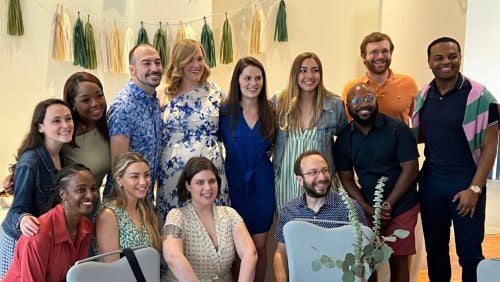
Kelly Heesch Sharbo, L'25, and her classmates at her baby shower.
“We have people who have traveled with the president on Air Force One, people who have been in the intelligence community – there's just a million different people who have had serious careers, and now they're in class with you.”- Maurice Roberson, L’25
Since its founding in 1870, Georgetown Law has had a part-time evening program for students who wish to pursue law degrees while still working full-time. In fact, the Law Center’s first class of 25 students were all evening students who kept their day jobs. Today, Georgetown’s evening program is considered the country’s best, with 30-some evening students enrolling every year.
For most evening students, completing a J.D. takes four years, not three, but otherwise they have the same opportunities all other law students do, from enrolling in clinics and practicums to participating in student-run organizations like journals and the Student Bar Association.
Recently, we spoke to four current evening program students to learn more about what brought them to the Law Center – and how they manage career, schoolwork and more.
Michael-Joseph Richardson, L’24: Data Cloud by Day, Cybersecurity by Night
Michael-Joseph Richardson, L’24, is a consultant for Microsoft, where he helps major companies move computer infrastructure and applications to online cloud computing servers. Since starting law school, he’s chosen to work with European firms, so he can complete a full work day in an earlier time zone before heading to campus in the afternoon.
“My classmates all seem to think I’m crazy,” he says of his double-stacked calendar.
Richardson plans to bring his new expertise in cybersecurity and data privacy to his existing field. He noticed a gap that needed filling in workplace discussions about such topics: the tech people didn’t know law and the lawyers didn’t know tech.
“I thought I could merge the law with my current job. There are quite a few security and legal implications of the decisions we make. The attorney in the room may get more credibility, but they may not understand the tech,” he said.
For Richardson, a major benefit of the evening program is the sense of camaraderie among classmates. “You’re all in the same classes all together and you’re all more collaborative with each other. There’s less competition, since you have more perspective.”
One way he likes to help out his fellow evening program members is sharing financial advice. He’s an enrolled IRS agent and is happy to answer classmates’ questions about the tax implications of business projects, grant funding and more. He’s also happy to receive their advice about their own areas of expertise.
“They teach me about X, Y, Z – and I teach them about taxes!” he said.
Katherine Hoops, L’25: A Doctor and Soon-to-Be Lawyer
Katherine Hoops, L’25, is on the faculty at Johns Hopkins School of Medicine in Baltimore, where she’s an attending physician in the pediatric ICU and conducts violence prevention and injury prevention research. She chose Georgetown Law not only because she could continue working in the hospital while taking law courses at night, but also because of its Health Justice Alliance, Georgetown’s version of a partnership model that combines legal and medical expertise.
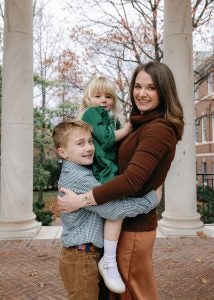
Katherine Hoops L’25 and her two children.
“Encountering a lot of unmet legal needs and policy barriers to health that my patients and their families were experiencing really led me to want to pursue training in the law,” she said. “When I learned more about the medical-legal partnership model, I realized that my institution desperately needed this resource – and that I could be the person to do that.”
Hoops recently completed an independent study with Professor Christy Lopez with the Center for Innovations and Community Safety. Their work focused on hospital-based violence intervention. “The opportunity to work with the team at CICS and Project Change in D.C. was super inspiring to a lot of work that we’re trying to now replicate in Baltimore,” she said.
Hoops is not only balancing her medical role, her schoolwork and her commute between Baltimore and Washington, D.C., she’s also a parent who didn’t want to miss bedtime every night. So this semester, she’s arranged to take all her classes in two days each week on campus. “The flexible scheduling was a huge asset for me,” she said – adding that of course, her time on the train gets put to use catching up on reading.
Kelly Heesch Sharbo, L’25: A Little Help from Friends
Kelly Heesch Sharbo, L’25, is a consultant managing a 200-person contract of engineers and logisticians who support the Navy and Marine Corps. With her background in military logistics, Georgetown Law’s strength in national security law was attractive. As a student, she’s involved with the Military Law Society, Georgetown Journal of International Law, Women in International Security and the National Security Law Specialization Program. She’ll be interning at the firm Hogan Lovells this summer, and longer-term is interested in working at the U.S. Treasury Department’s Committee on Foreign Investment in the United States.
“I feel like next summer I’ll actually be of some use already, which is really cool. And I don’t think that would be possible if I were at any other law school,” she said.
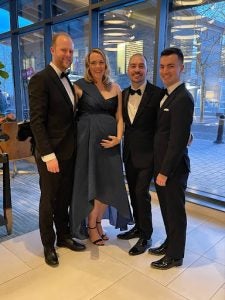
(l-r) Jon Sharbo, Kelly Heesch Sharbo, Josh Rebollozo, Dan Vance Rebollozo
Like many other students in the evening cohort, Sharbo is also a parent. Last spring, she gave birth right after finals. Six weeks later, though sleep deprived – she participated in the Office of Career Strategy’s annual On Campus Interviews, where students interview for summer jobs with top law firms across the country. “Timing was very, very good,” she quipped.
Sharbo credits the friendships she’s formed for helping adjust simultaneously to law school and parenthood. “Try and make time for friendships, because they are what is going to get you through,” she advised.
Even though the evening students are among the most determined and productive people on campus, Sharbo said that doesn’t translate to cutthroat competition in the classroom.
“Everyone just is there to help each other and make each other better, which is wild and very cool to witness,” she said. “And now that we’re getting into the later years, we’re all becoming much closer friends.”
Maurice Roberson, L’25: Keep Trucking
Maurice “Moe” Roberson, L’25, grew up in Washington, D.C., in an under-resourced neighborhood east of the Anacostia River. After high school, he enrolled in community college, but three semesters in he had to withdraw because of financial constraints after a car accident. He was homeless for a brief period, started at an automotive trade school, then joined the Massachusetts Army National Guard, where he worked as a mechanic and was deployed to the Middle East.
Once he met his wife, a law student at the time, he was introduced to a different world. He completed his undergraduate degree and was accepted at Georgetown Law. Wanting to keep up an income, his solution was to start his own business: a trucking company.
Here’s what his schedule looked like during his first year of classes: Get home from class at 8:30 p.m., fall asleep by 10 pm, wake up at 1 a.m. to head to a freight depot in Baltimore. Spend the rest of the wee hours in the truck, back
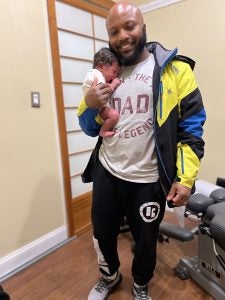
Roberson with his newborn.
to bed around 8 a.m., wake up at noon to prepare for class, then head to campus for class at 5:45 p.m. “It was probably one of the most energetic times of my life,” he recalled. And if that’s not enough, add to the mix a newborn – he and his wife became parents in January 2024.
Roberson knows he’s not the only student with a lot on his plate, however. “The evening cohort is super supportive of one another. We’re all working big-time jobs and supporting our personal lives and embarking on this law school journey.” He loves hosting cookouts where he and his classmates can relax a bit and swap stories.
After graduating, he’s thinking of becoming a tax attorney. He enjoyed an internship last summer at the firm Faegre Drinker, and noticed the tax lawyers seemed to have a good work-life balance.
His best advice for future students? Learning isn’t limited to the classroom. “Embrace everything about everyone and everything in law school, even the things you don’t like,” he said. “It may influence the world one day.”
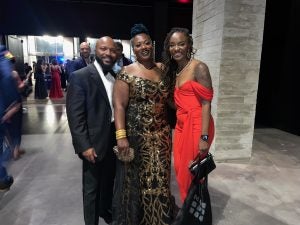
Maurice Roberson, L’25, his wife, and fellow evening student Saundrea Rupert-Shropshire, L’24.